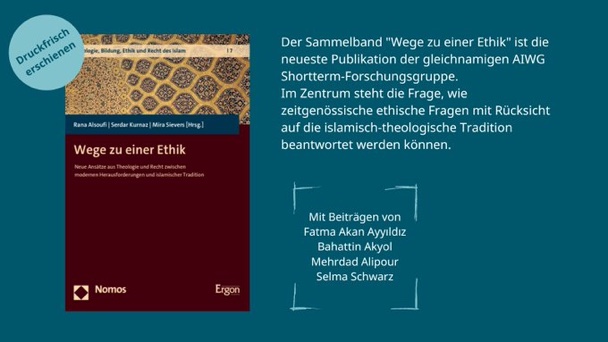
Great to see that the book titled “Wege zu einer Ethik” (edited by Alsoufi, Kurnaz, and Sievers) has been published. It was part of a two-year joint project (Goethe University of Frankfurt and Humboldt University of Berlin) funded by AIWG: https://www.nomos-shop.de/nomos/titel/wege-zu-einer-ethik-id-105716/
My contribution to this volume includes two articles:
1. “Ethical Assessment of Acts in the Prospect of Before Revelation: an Examination of Šarīf al-Murtaḍā’s Approach” This article deals with a prolonged debate in Muslim systematic theology (kalām) and legal theory (uṣūl al-fiqh). It concerns the moral assessment of useful things/acts before revelation or before the arrival of revelation. This issue posits the question of what can be said morally about useful things/acts before or in the absence of revelation. The central query in this debate is about the fundamental nature of actions: are they in nature permitted (mubāḥ) or proscribed (maḥẓūr)? Muslim scholars held various opinions in response to this question. Closely studying Šarīf al-Murtaḍā (the prominent Šīʿī scholar of the eleventh century), the article strives to elaborate on the notion of the before revelation dilemma in classical Šīʿī context. It then investigates the principle of rational assessment of goodness and vileness, as an essential prerequisite of the before revelation problem. Finally, it examines Šarīf al-Murtaḍā’s position as an illustrative classical Šīʿī doctrine regarding the before revelation matter. The paper is particularly concerned with the potential of Šarīf al-Murtaḍā’s standpoint in relation to the role of reason in Islamic legal and ethical reflections.
2. “Homosexuality in the Prospect of Before Revelation” This paper attempts to seek repertories or discursive spaces of classical Imāmi thought to negotiate homosexuality in Islam. The article thus examines Šarīf al-Murtaḍāʼs approach to the before revelation discourse (ḥukm al-ašyāʾ/al-afʿāl qabl wurūd aš-šarʿ) to explore whether it can be used to open a constructive dialogue with traditional Muslim scholars on modern homosexuality. In doing so, the paper first explicates the concept of modern homosexuality. Using a genealogical approach, it then explores similar phenomena in classical Muslim cultures and legal traditions. Next, it compares modern homosexuality with pre-homosexual categories to accentuate the distinctions between homosexuality and pre-modern same-sex sexual behaviours. Finally, it examines to what extent the principle of permissibility, as articulated by Šarīf al-Murtaḍā, can be deployed to legally and morally reevaluate modern homosexuality in Islam in the absence of Revelation.


